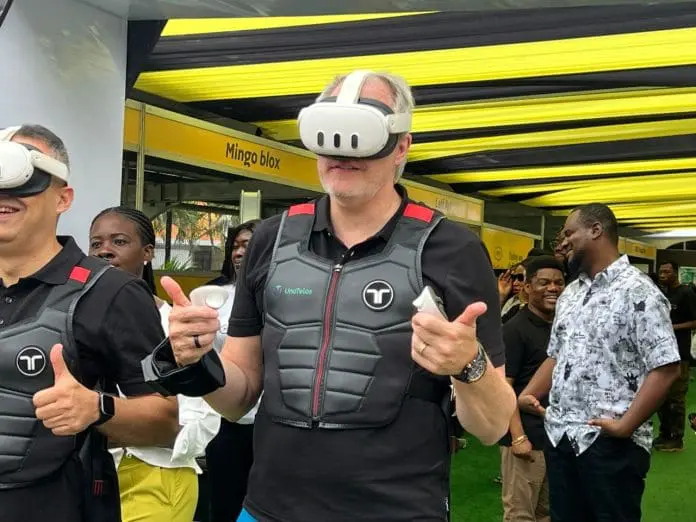By Ghana News
Copyright ghanamma

MTN Ghana is pushing for a tiered revenue-sharing model that would give gaming start-ups a larger cut of earnings, arguing that treating emerging developers the same as established companies stifles growth before it begins.
Speaking at the MTN DigiFest 2025 Gaming Focus Group and Closing Session held at the company’s head office, Yaw Antwi Boadu, Manager for Video and Gaming at MTN, outlined an approach designed to balance fair monetization with industry development and player experience.
The proposal challenges conventional platform economics, where distributors typically apply uniform revenue splits regardless of developer size or maturity. Boadu’s argument is straightforward: when start-ups are already working with small revenue bases, taking a standard platform cut can make survival impossible.
“For start-ups, the revenue is already small. If you give them an even smaller percentage, you cripple them at the very beginning,” Boadu explained. His proposed solution involves differentiated treatment, with emerging developers receiving a higher percentage share while larger companies with established revenue streams and advanced technologies face different terms.
It’s a recognition that one-size-fits-all approaches don’t work when trying to nurture an ecosystem. Established gaming companies can absorb platform fees because they operate at scale—their large user bases generate sufficient volume that revenue splits still leave meaningful income. Start-ups lack that cushion, meaning every percentage point of the revenue share determines whether they can afford to keep developing.
Beyond revenue mechanics, MTN is leveraging what might be its most valuable asset for developers: access to millions of potential players. With over 18 million active subscribers, the telecommunications giant’s digital platforms—including the MyMTN app—offer visibility that most start-ups couldn’t achieve through their own marketing efforts.
“Imagine publishing your game on MTN’s platform and instantly gaining millions of potential users discovering it,” Boadu said, positioning the company as a distribution channel that could transform local developers’ reach overnight. For context, Ghana’s entire population sits around 33 million, meaning MTN’s subscriber base represents more than half the country’s potential gaming market.
That distribution power matters particularly for mobile gaming, which dominates Africa’s gaming landscape given limited console and PC penetration outside major cities. Mobile phones serve as the primary gaming platform for most Ghanaians, making carrier relationships strategically important for developers trying to reach mass audiences.
But Boadu also warned against letting monetization strategies undermine the core product. While in-app purchases and premium models drive revenue, he stressed that developers must maintain balance or risk alienating the players who determine whether games succeed or fail.
“There’s a thin line between revenue and the gaming experience. If you prioritize money too much, you disrupt the fun,” he cautioned, urging developers to keep player experience paramount while building sustainable revenue streams. It’s advice grounded in the reality that aggressive monetization—whether through excessive ads, paywalls, or predatory mechanics—can kill user engagement faster than any technical flaw.
The gaming manager pushed developers toward more diversified revenue thinking, arguing that relying exclusively on in-game payments leaves businesses vulnerable to market shifts or player preference changes. Sustainable success, he suggested, requires exploring multiple revenue sources beyond the game itself.
“Developers and publishers must look at all aspects of revenue generation—not just the game itself. That’s how you stay resilient,” Boadu added, implicitly referencing opportunities like merchandising, licensing, competitive gaming, and content creation that successful gaming franchises exploit.
Boadu also expressed interest in Ghana’s emerging eSports ecosystem and gaming academies, which he described as critical infrastructure for developing the next generation of gaming talent. When someone mentioned an eSports gaming academy during discussions, his response indicated MTN might see partnership opportunities in that space.
“I noticed the mention of an eSports gaming academy—if that’s your initiative, then I’d like to know more. Are they partners or sponsors? Because these are the kinds of platforms that will shape the future of gaming in Ghana,” he remarked, signaling that MTN’s gaming ambitions extend beyond simple distribution into broader ecosystem development.
The interest makes strategic sense. ESports represents one of the fastest-growing segments in global gaming, and Africa remains relatively underdeveloped in competitive gaming infrastructure despite having substantial player populations. Companies that help build that infrastructure early could benefit from first-mover advantages as the market matures.
DigiFest 2025 features gaming stations, demonstrations of the MyMTN app, and various engagement activities as part of MTN’s broader push to position itself as a technology enabler rather than just a telecommunications operator. Gaming represents one element of that transformation, alongside artificial intelligence initiatives and digital service expansion.
For Ghana’s gaming industry, MTN’s proposed approach represents a potentially significant shift. Local developers have historically struggled with distribution and monetization challenges, often lacking the resources to reach audiences beyond immediate networks or compete with international titles that dominate app stores.
If MTN follows through on its pledges—offering favorable revenue shares, distribution access, and ecosystem support—it could lower barriers that have prevented many talented Ghanaian developers from turning creative ideas into sustainable businesses. The question is whether the proposed model delivers meaningful support or simply creates the appearance of partnership while maintaining platform control.
As the DigiFest gaming sessions concluded, Boadu emphasized the need for stronger partnerships across the industry’s various players. His vision positions MTN as a facilitating platform that helps local gaming develop on terms that don’t favor established players at emerging developers’ expense.
“Start-ups must be empowered, players must enjoy their games, and revenue models must sustain the industry. That’s the only way forward,” he concluded, articulating a vision where commercial interests align with ecosystem health rather than operating in tension.
Whether MTN implements this vision in practice remains to be seen. Platform pledges don’t always translate into favorable contract terms, and developers will ultimately judge the company by what it delivers rather than what it promises. But at minimum, the gaming manager’s comments signal recognition that Ghana’s gaming industry needs support structures different from what serves mature markets.
For Ghanaian developers watching these discussions, the opportunity is clear: a major telecommunications company is expressing willingness to adjust its business model to support local gaming growth. Whether that translates into meaningful partnerships or just another platform extracting value will become apparent when contracts get signed and revenue starts flowing.



